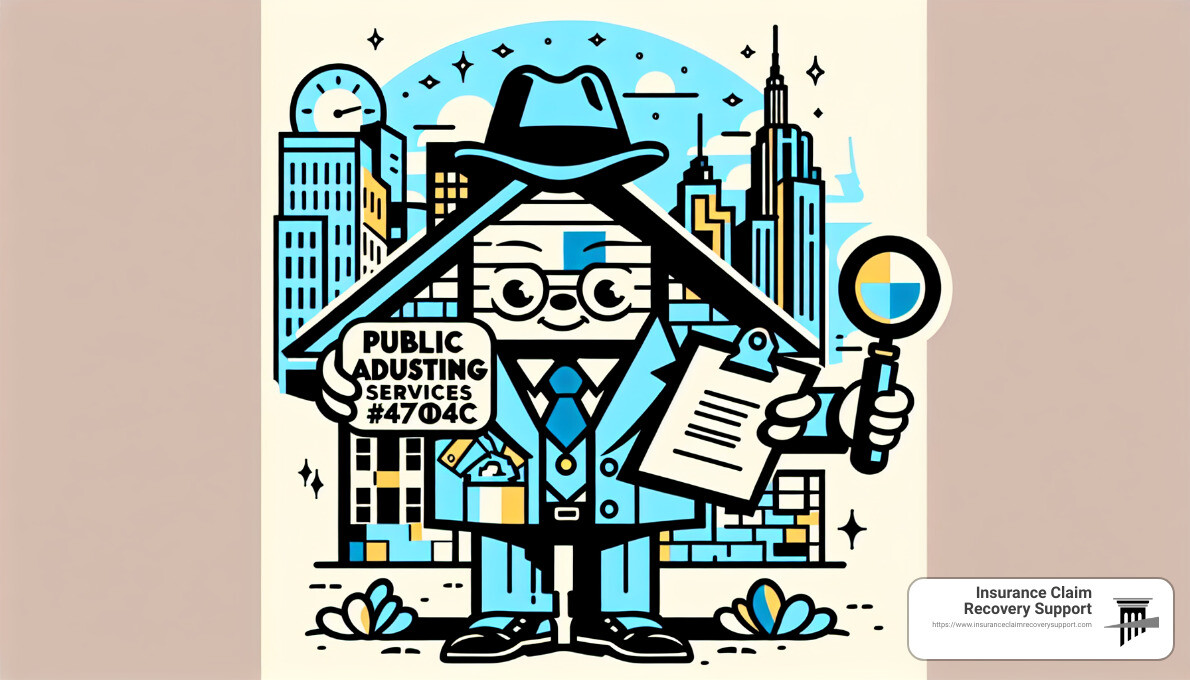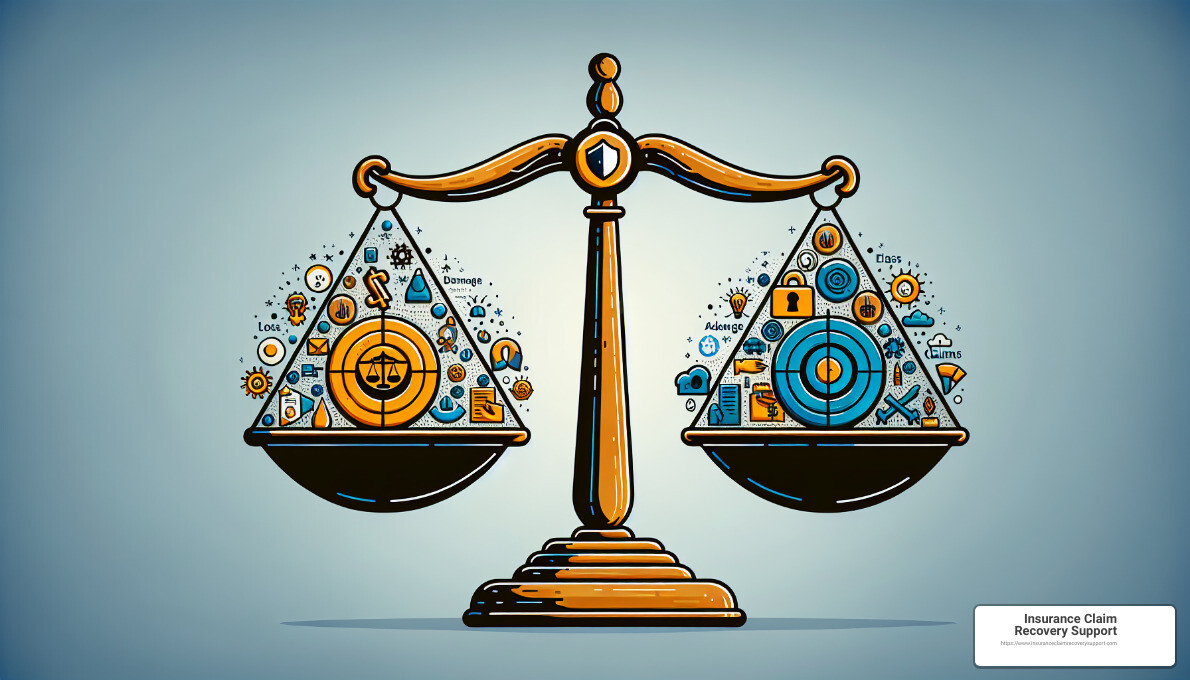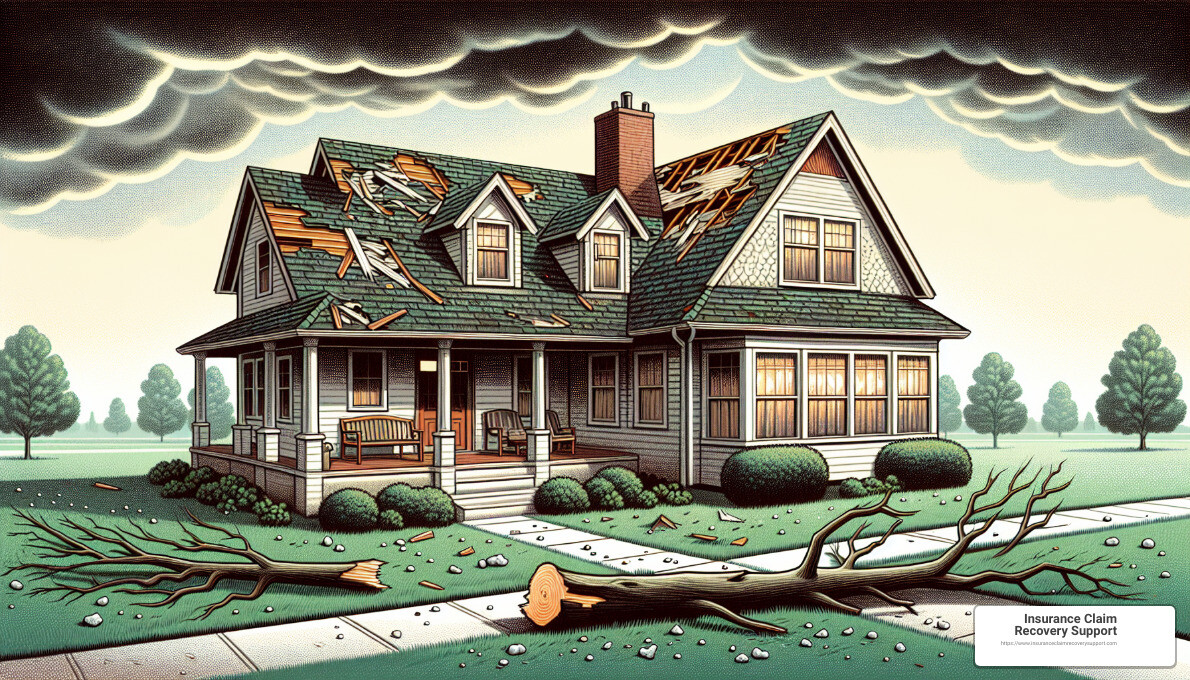Introduction
Have you ever experienced the disappointment and frustration that comes with an underpaid insurance claim or unnecessary delays in the settlement process? If so, you may have considered seeking assistance from public adjusting services to help manage your claim. However, it’s not as simple as just hiring any public adjuster. There are potential pitfalls and costly mistakes to avoid along this path.
Public adjusters are independent insurance professionals who evaluate property damage, interpret insurance policies, and negotiate claims on behalf of policyholders like you. Insurance Claim Recovery Support is dedicated to ensuring that your claim is handled professionally, maximizing your settlement and minimizing your stress. However, along the way to getting you the settlement you deserve, there are several foundational errors that can seriously undermine the process.
By avoiding these common mistakes, you can increase your chances of a fair and prompt settlement of your insurance claim.
Key Public Adjuster Selection Considerations:
- Check licensing and credential information.
- Understand the fee structure upfront.
- Ensure effective communication channels are in place.
- Consider the adjuster for large or complex claims.
- Engage the adjuster early in the claim process.

In the following sections, we’ll delve into these five devastating mistakes and share expert tips to help you avoid them, ensuring a smooth claiming process.
Mistake 1: Not Checking the Public Adjuster’s Credentials
When it comes to public adjusting services, one of the most common and detrimental mistakes policyholders make is failing to verify the adjuster’s credentials. This can lead to serious consequences, including delays, underpayment, or even denial of your claim. You should also verify your insurance company adjuster’s, preferred vendors, and representatives’ credentials as well.
Importance of Hiring a Licensed Public Adjuster
Working with a licensed public adjuster is critical to the success of your claim. Licensed adjusters have passed rigorous exams, undergone background checks, and are required to complete continuing education to stay up-to-date with industry practices and regulations. This ensures they have the knowledge and skills to handle your claim professionally and effectively.
How to Verify a Public Adjuster’s License in Texas
Fortunately, in Texas, verifying a public adjuster’s license is straightforward. The Texas Department of Insurance provides resources for checking an adjuster’s license online. This verification not only protects your claim but also ensures you’re working with a competent and law-abiding adjuster.
At Insurance Claim Recovery Support, we pride ourselves on meeting these stringent licensing requirements, bringing our expertise and dedication to every claim we handle.
Consequences of Hiring an Unlicensed Public Adjuster
Engaging an unlicensed adjuster can have serious repercussions. Without the necessary knowledge and experience, they may not accurately assess your damage, properly document your losses, or effectively negotiate your settlement. This can result in a lower payout than you’re entitled to, or even a complete denial of your claim.
Moreover, unlicensed adjusters may not adhere to ethical practices and destroy your credibility, which could put you at risk of fraudulent or unethical actions.
Several states have recently passed legislation with the goal of expanding UPPA (unlicensed practice of Public Adjusting) and increasing penalties for those who violate it.
Public Adjuster By Definition
A public adjuster is a claims adjuster who acts on behalf of a policyholder in appraising and negotiating a first-party insurance claim. The roles of a public adjuster often include assessing property damage, creating an estimate for repairs, reviewing insurance policies, determining coverages, and documenting a claim.
In almost every state, UPPA laws exist to prevent roofing contractors from doing anything except preparing an estimate for the damage. However, several states including Texas have passed laws that effectively prevent unlicensed individuals or organizations from assisting a policyholder with their claim, unless they have a valid public adjuster’s license and there is no conflict of interest.
Texas Insurance Code Sec. 4102.163 states, CERTAIN CONTRACTOR BUSINESS PROHIBITED. (a) A contractor may not act as a public adjuster or advertise to adjust claims for any property for which the contractor is providing or may provide contracting services, regardless of whether the contractor:
(1) holds a license under this chapter; or
(2) is authorized to act on behalf of the insured under a power of attorney or other agreement.
Choosing the right public adjuster is a crucial step in ensuring a successful insurance claim process. So, avoid this common mistake by always verifying the adjuster’s credentials before entrusting them with your claim.
Mistake 2: Not Understanding the Public Adjuster’s Fee Structure
One of the most common mistakes that policyholders make is not fully understanding the public adjuster’s fee structure. This can lead to unpleasant surprises later on when the adjuster’s fee is deducted from the insurance settlement.
Typical Fee Structures of Public Adjusters in Texas
In Texas, the fees charged by public adjusters like us at Insurance Claim Recovery Support are regulated by state law. Public adjusters can charge up to 10% of the total gross settlement for new claims, less the deductible.
For supplemental claims, the fee limit is typically the lesser of either 20-25% percent of new money or 10% of the gross settlement, less the deductible. These fees are separate from your insurance deductible, meaning your insurer will not cover these costs.
Importance of Clear Communication About Fees
Clear communication about fees is essential to avoid misunderstandings and ensure a smooth claims process. Before hiring a public adjuster, make sure you have a comprehensive understanding of the fee structure. At Insurance Claim Recovery Support, we pride ourselves on our transparency. Our fees are upfront, clear, and simple to understand. We believe that our clients should never be in the dark about what they are being charged and why.
Risks of Not Understanding the Fee Structure
Not understanding the fee structure can lead to unexpected costs and disappointment with the final settlement. You might be expecting a certain amount based on the estimated cost of damages, only to receive less because of the adjuster’s fees. This can significantly affect your ability to recover from the loss.
To avoid this, always read the contract carefully and make sure you understand the fees before hiring a public adjuster. If you have any questions about the fee structure, don’t hesitate to ask. It’s better to clarify any confusion upfront than to be surprised later on.
A well-informed policyholder is a successful policyholder. Understanding how public adjusting services are priced can help you avoid costly mistakes and ensure you receive a fair settlement.
Mistake 3: Failing to Communicate Effectively with the Public Adjuster
Just as in any professional relationship, effective communication is crucial when working with a public adjuster. Unfortunately, many policyholders make the mistake of not maintaining regular contact with their adjuster, leading to misunderstandings and missed opportunities.
Importance of Regular Communication with Your Public Adjuster
Maintaining regular communication with your public adjuster is key to ensuring your claim is processed efficiently and accurately. Public adjusters need to stay informed about any changes or updates related to your claim. This includes new damage discoveries, additional costs incurred, or any correspondence with the insurance company.
At Insurance Claim Recovery Support, we believe in keeping our clients in the loop at all times. We understand that the claims process can be complex and confusing, which is why we’re committed to providing clear and consistent communication every step of the way.
Risks of Poor Communication in the Claim Process
One of the biggest risks of poor communication is that it can lead to misunderstandings about the claim’s progress or the settlement amount. It might also lead to missed deadlines or important information being overlooked, potentially affecting the final settlement.
Additionally, a lack of effective communication can result in frustration and dissatisfaction, which could strain your relationship with your public adjuster and impact the overall claim handling process.
Tips for Effective Communication with Your Public Adjuster
Here are a few tips to ensure effective communication with your public adjuster:
- Be proactive: Don’t wait for your adjuster to contact you. Regularly check in to get updates on your claim’s progress.
- Be clear and concise: Provide clear and complete information about your claim. If you’re not sure about something, don’t hesitate to ask for clarification.
- Document everything: Keep a record of all your communications with the adjuster, including emails, letters and phone calls. This can be helpful if there are any disputes or misunderstandings down the line.
Your public adjuster is there to help you navigate through the complex claims process. By maintaining open and effective communication, you can avoid common mistakes and ensure a smooth and successful claim process. At Insurance Claim Recovery Support, we’re dedicated to providing top-notch public adjusting services, and that starts with clear and consistent communication with our clients.
Mistake 4: Not Utilizing a Public Adjuster for Large or Complex Claims
When it comes to large or complex claims, it is essential to leverage the expertise of a public adjuster to ensure maximum coverage. Missing this crucial step can lead to complications, financial losses, and a lot of stress.
Benefits of Hiring a Public Adjuster for Large or Complex Claims
Large claims, especially those resulting from catastrophic events like natural disasters, hail, flood, wind, or fires, require a specialized level of expertise that often goes beyond what a regular adjuster can provide. These types of claims involve substantial amounts of money, complex coverage issues, and a detailed damage assessment. A skilled large-loss public adjuster with the necessary experience and knowledge, like our team at Insurance Claim Recovery Support, can handle these cases more effectively.
Public adjusters can help figure out tricky insurance matters, such as determining how much of the water damage was due to rain coming in through a torn-up roof, water damage from a fire department’s efforts to put out a fire, or how much was due to flooding. They can help you navigate the mitigation process, get the most from each available policy, and ensure you receive every dollar you’re entitled to.
Risks of Handling Large or Complex Claims Without a Public Adjuster
Without the assistance of a professional public adjuster, dealing with large claims can be overwhelming. The process is significantly different from regular claims due to the high costs involved and the complexity of the estimate process. If you attempt to handle it on your own, you risk financial losses, unnecessary delays, and even potential litigation. A public adjuster can help to avoid these pitfalls and ensure a smooth claims process.
Contractors Roles
Contractors are an important part of the rebuild process but they are not a party to the insurance policy nor do they have authority to negotiate on behalf on a policyholder.
Contractors Can….
- Show the areas of damage and explain why they believe it is the result of covered loss such as fire, hail, wind, storm, etc.
- Explain and answer questions regarding the scope of your suggested repairs and why each item of repair/work is reasonable and necessary.
- Identify additional items of work required due to code upgrades.
- Answer questions regarding how the work was priced.
- Explain OH&P charges on all work included in their bid,
Contractors Cannot….
- Discuss what the insured’s policy may or may not, or should or should not, cover.
- Insist the insurance adjuster authorizes any particular item(s) of work be included in the repair.
- Engage in any discussions with the adjuster about why they must pay for OH&P or any other items in their bid.
- “Agree” with the adjuster on some form of modification to your scope.
- “Agree” with the adjuster on some form of modification to your pricing.
The principal is the same as a subcontractor cannot contractually obligate a contractor to a customer.
No Deductible Waivers
Chapter 707 of the Texas Insurance Code states: “A person insured under a property insurance policy shall pay any deductible applicable to a first-party claim made under the policy” See Tex. Ins. Code §707.002.
Under Texas House Bill 2102, it is illegal for contractors to pay for a policyholder’s deductible in any way, shape, or form. It is a violation of this law if a contractor:
- Pays for,
- Waives,
- Absorbs,
- Rebates,
- Credits or Offsets or
- Otherwise assists the insured in any other manner in avoiding monetary payment of the required insurance deductible or provides a good or service knowing that the insured will pay for the good or service with the proceeds of a claim under the policy and without the insurer’s consent to do so.
Violating the law creates a Class B misdemeanor offense of 180 days in county jail and a fine of up to $2000, for (1) a business who sells goods or services to provide such a good or service in such a prohibited manner (violating contractor), (2) an insured (policyholder)who commits an offense if the person, in connection with a first party claim knowingly submits or allows a claim to be submitted in violation of subsection c, (the violation section directly above) unless the insured person promptly notifies the insurer of the violation.
The bottom line is if a contractor or roofer offers to cover your deductible, that means that they are willing to commit fraud and you need to seriously question if you can trust them with your assets. Legitimate contractors and roofers don’t do shoddy repairs and cut corners. They follow the rules, stand behind their work, maintain fair business practices, and are the ones you want to work with.
Where Is The Line Between A Roofer And a Public Adjuster?
Can a roofer or contractor discuss the amount of damage to the consumer’s home, the appropriate replacement, and the reasonable cost of replacement with the insurance company?
• Yes. A roofer or contractor may discuss these scope and cost with the consumer or insurance company to the extent that they are relevant to the estimate to repair damage to the consumer’s property.
Can a roofer or contractor advocate on behalf of a consumer and discuss insurance policy coverages and exclusions?
• No.
Can a roofer or contractor answer questions about its estimate for a consumer’s claim?
• Yes. The roofer or contractor may discuss the scope of work in its repair estimate with the consumer or the consumer’s insurance company.
If an original estimate is later found to be insufficient, may a roofer or contractor answer questions about its revised estimate? • Yes. The roofer or contractor may discuss supplements and clarifications concerning the revised estimate with the consumer or the consumer’s insurance company.
Case Studies of Successful Large Claim Settlements With a Public Adjuster
One of the best ways to understand the impact of public adjusting services is to look at actual cases. For instance, in one case handled by our team at Insurance Claim Recovery Support, we were able to assist a policyholder with a complex claim resulting from a devastating hurricane. The claim involved multiple policies, including homeowners insurance, windstorm insurance, and flood insurance. With our expertise, we were able to accurately assess and document the damage, leading to a substantial settlement that fairly compensated the policyholder for their losses.
In conclusion, large or complex claims require the expertise of a skilled public adjuster. At Insurance Claim Recovery Support, we specialize in these types of situations, ensuring a fair and prompt settlement for our clients. Avoid making the mistake of handling large or complex claims on your own, and instead, trust the professionals to navigate the process for you.
Mistake 5: Not Hiring a Public Adjuster Early in the Claim Process
The timing of hiring a public adjuster can significantly influence the outcome of your claim. Many policyholders often wait until they face challenges in the process or receive an unsatisfactory settlement offer from their insurance company before they consider engaging public adjusting services. This approach can inadvertently create complications and delays in the claim handling process.
Benefits of Hiring a Public Adjuster at the Beginning of the Claim Process
Engaging a public adjuster at the onset of your claim process can have several advantages. These professionals bring an extensive understanding of insurance policies and the complexity of property damage claims to the table. Their expertise allows them to accurately evaluate the full extent of your property damage and determine a fair payout amount, right from the start.
A public adjuster works on your behalf, meticulously documenting every aspect of your claim and substantiating it with the necessary evidence. This high level of detail and precision can often result in a higher overall payout.
Risks of Delaying the Hiring of a Public Adjuster
Delaying the hiring of a public adjuster can result in several risks. One primary concern is that policyholders may overlook certain damages or fail to fully document their loss. This could result in a lower payout from the insurance company, leaving the property owner to cover some expenses out of pocket.
Furthermore, starting the process on your own and then bringing in a public adjuster later on can further delay your claims handling process. If your property has sustained significant damage, it’s best to hire a public adjuster early on to expedite the process and to ensure your claim is properly managed from the start.
How a Public Adjuster Can Help Maximize Your Claim Payout from the Start
A public adjuster can play a crucial role in maximizing your claim payout right from the start. By accurately determining the full extent of your loss, a public adjuster can help you avoid or minimize out-of-pocket expenses. They ensure that all losses are accounted for and adequately documented, which can significantly increase the overall payout from your insurance company.
In conclusion, to make the most out of your insurance claim, it’s imperative to avoid the mistake of delaying the hiring of a public adjuster. At Insurance Claim Recovery Support, we believe in stepping in early, providing comprehensive assistance to ensure you receive the maximum settlement you deserve in a timely manner.
Conclusion
Recap of the Common Mistakes to Avoid in Public Adjusting
Navigating public adjusting services can be challenging and complex. It’s vital to be aware of potential pitfalls and avoid common mistakes. We’ve highlighted several key missteps to watch out for: not checking a public adjuster’s credentials and licensure, not understanding the fee structure, failing to communicate effectively with your adjuster, not leveraging an adjuster for large or complex claims, and delaying the hiring of an adjuster. Each of these mistakes can lead to a lower claim settlement, increased stress, and a more complicated claims process.
Final Thoughts on the Importance of Hiring a Qualified and Experienced Public Adjuster
Recognizing the value of a qualified and experienced public adjuster is crucial. They can save you time, reduce stress, protect your rights, and help you avoid disputes, thereby leading to a more favorable settlement. Understanding your policy and the claims process can be challenging, but an experienced public adjuster can guide you through the intricacies, ensuring you receive the compensation you’re entitled to.
How Insurance Claim Recovery Support LLC can Help Avoid These Mistakes and Ensure a Fair Claim Settlement
At Insurance Claim Recovery Support, we are committed to providing policyholders with the support they need throughout the claims process. Our team of professionals is experienced and knowledgeable about state statutes, ordinance & law requirements, proficient in completing insurance forms and providing proper documentation.
We help our clients avoid these common mistakes, offering them invaluable assistance in navigating the complexities of insurance claims. We work on contingency, meaning we only get paid when you do. Our primary goal is to ensure that you receive the compensation you’re rightfully entitled to.
If you would like to learn more about how we can assist you with your claim, we encourage you to explore other articles on our website. For example, our article on what is a good public adjuster and when a policyholder should hire a public insurance adjuster can provide further insights into the benefits of hiring a public adjuster.
Avoiding these common public adjusting mistakes can greatly enhance your claims experience and ensure you receive the maximum compensation you deserve. At Insurance Claim Recovery Support, we’re here to support you every step of the way.










